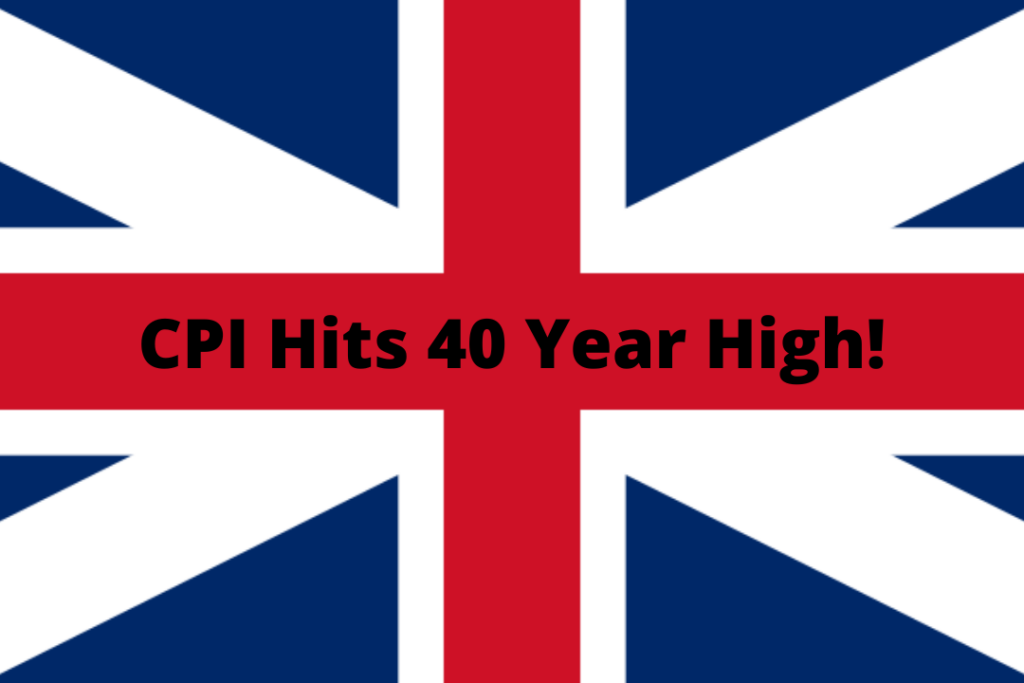The UK CPI Reaches a 40-Year High in June
Official statistics that highlight the likelihood of a larger-than-normal increase in the Bank of England’s interest rate next month show that British consumer price inflation soared once again in June, reaching an annual rate of 9.4%, the highest rate since early 1982.
A Reuters poll of economists had pointed to a reading of 9.3%, up from 9.1% in May.
It comes as real wages fell by 3.9% as pay fails to keep up with inflation, the Office for National Statistics (ONS) reported.
The increase was driven by rising fuel and food prices, these were only slightly offset by falling second-hand car prices.
The most recent rise indicates that, among the Group of Seven major countries, Britain had the highest rate of inflation in June!
Although Canada and Japan have yet to report June data, neither is likely to come close to Britain’s price growth.
The BoE has increased borrowing rates five times since December in an effort to prevent the recent spike in inflation from permeating the British economy, and it is anticipated that it will do so once more at its monetary policy meeting in August.
The biggest causes of inflation last month, according to the Office for National Statistics (ONS), were a 42% increase in petrol prices year-on-year and an increase in food prices of roughly 10%.
The ONS said core inflation in June stood at 5.8% compared with 5.9% in May, which is in line with the Reuters poll forecast.
There were signs of further inflation pressure ahead.
The ONS reported that the prices British firms paid for materials and energy in June were 24% more than a year earlier. This was the largest rise since these records started in 1985 and is a significant component of the costs that consumers ultimately pay in stores.
Prices charged by factories jumped by 16.5%, the most since September 1977.
Finance minister Nadhim Zahawi said the UK was not alone in facing runaway inflation and the government was joining forces with the BoE to tackle the problem.
“Countries around the world are battling higher prices and I know how difficult that is for people right here in the U.K., so we are working alongside the Bank of England to bear down on inflation,” Zahawi said in a statement.
“We’ve introduced £37 billion worth of help for households, including at least £1,200 for 8 million of the most vulnerable families and lifting over two million more of the lowest paid out of personal tax.”
What has caused today’s inflation rate to rise?
The main causes of June’s increased inflation rate of 9.4% were the increasing prices of food and fuel.
The price of motor fuels has increased significantly over the previous two years, with an average price increase of 43% in the 12 months leading up to June 2022.
In June 2022, the average price of petrol was 184.0 pence per litre, up from 129.7 pence per litre a year earlier.
The greatest monthly rise in petrol prices since 1990 occurred last month when prices increased by 18.1p per litre.
Additionally, the average price of petrol in June 2022—192.4 pence per litre—was the highest ever recorded.
How much have food costs increased?
The latest ONS figures show the prices for food and non-alcoholic drink rose by 9.8% in the year to June.
The figure is up from 8.7% in May and is the highest rate since March 2009.
The biggest contributors to June’s inflation figures were milk, cheese, and eggs.
Other increases included the price of vegetables, meat, and ready meals.
What has the reaction been to the inflation figures?
“With further energy bill increases due to take effect from October, the peak in inflation is still some way off, and is not expected to return to the 2% target before mid-2024,” Yael Selfin, chief economist at KPMG UK, said.
She said: “This means more pain is on the way for household budgets as the high rate of inflation continues to outpace wage growth, bringing down the real value of incomes across the UK.
“We also expect the Bank of England to continue raising the base interest rate, which we now expect to reach two per cent early next year, to stave off further rounds of inflation rises.”
As family budgets are “pushed to the brink” by inflation, Labour’s shadow chancellor Rachel Reeves criticised the government’s “chaos, distraction, and unfunded fantasy economics.”
In light of the ongoing leadership fight, Liberal Democrat Treasury spokesman Sarah Olney accused the Conservatives of operating a “zombie government” that failed to address the cost-of-living problem.
She demanded a reduction in VAT because households are being “hammered by relentless price hikes” and to “cut prices at the shopping tills and fuel pumps.”
online sources: msn.com, ons.gov.uk, inews.co.uk All opinions and views expressed or suggested by the Digital Zeitgeist are not necessarily the same opinions and views held by or suggested by GPM-Invest plus any and all partners, affiliates, parties, or third parties of GPM-Invest. Any type of media distributed by GPM-Invest IS NOT financial advice. Please seek advice from a professional financial advisor

